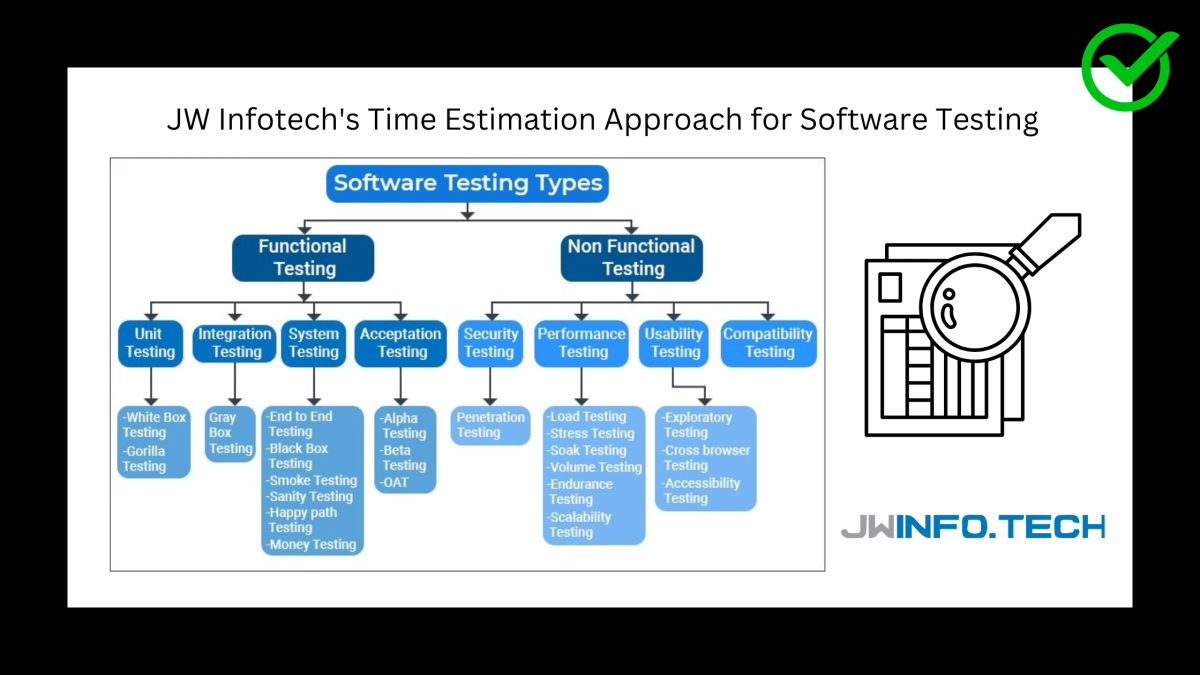JW Infotech’s Time Estimation Approach for Software Testing

How JW Infotech Approaches Estimation and Proposals: A Structured Approach
February 26, 2025
Case Study: Enhancing Legal Clarity with AI Legal Chatbot
March 12, 2025Efficient time estimation is a critical aspect of software testing, ensuring smooth execution while balancing resource allocation. JW Infotech follows a structured estimation model to define testing efforts based on different project requirements. The approach includes various testing types, such as functional, performance, compatibility, regression, and mobile responsiveness testing. This report presents a quantitative breakdown of time estimations used in different projects without referencing specific project names or monetary aspects.
Testing Categories and Time Estimations
1. Functional Testing & Regression Testing
Functional testing ensures the core functionalities of an application work as intended. Regression testing, on the other hand, ensures that new updates do not introduce defects in existing functionalities.
Test Case Estimations
- General Functional Testing: Each test case typically requires 10 minutes for execution.
- Regression Testing (Login, Service Purchase, Promotion Flows):
- 60 test cases → Estimated execution time: 10 hours
- Defects Estimation: Approximately 25% of test cases may have defects, requiring an additional 2.5 hours for bug verification and resolution.
2. Mobile Responsiveness Testing
Mobile responsiveness testing ensures that an application adapts effectively across different screen sizes and devices.
- Testing across 40 screens on a single device requires 7 hours for execution.
- Bug Fixing & Verification: Estimated 2 hours for defect retesting, assuming 25% of test cases require modifications.
3. Performance Testing
Performance testing is aimed at evaluating system stability, response time, and scalability under various conditions. The primary testing types include:
- Load Testing: Evaluates system behavior under expected user loads.
- Stress Testing: Assesses the system’s ability to handle extreme conditions.
While exact estimations may vary depending on API availability and project scope, past projects have allocated significant effort toward performance evaluations. A common pattern observed is that API performance testing estimation is finalized after receiving complete API details.
4. Defect Management & Debugging
A structured approach is used for defect tracking, incorporating time for debugging and verification.
- One defect cycle typically requires 20 minutes per defect.
- Bug verification in regression cycles follows the 25% defect estimation model, with necessary rework hours allocated accordingly.
Resource Allocation Strategy
- Lead QA Engineers with 12+ years of experience are responsible for high-priority test executions.
- Test Automation Engineers develop scripts and manage regression cycles using automation frameworks like Appium for mobile applications.
- Performance Testing Teams employ tools such as K6 to conduct load and stress testing.
The team follows an iterative execution model, prioritizing smoke tests before deep-dive testing cycles.
JW Infotech employs a structured and data-driven estimation approach to testing, ensuring accuracy in resource allocation and execution timelines. By breaking down testing efforts into well-defined units, the company maintains high testing efficiency and predictable delivery timelines.



